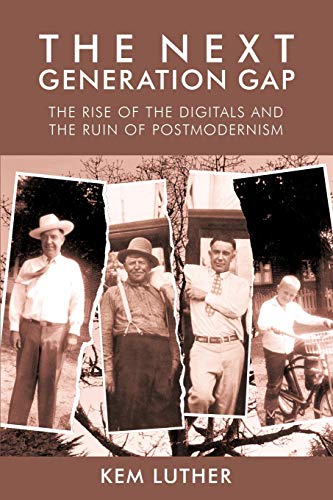Items related to The Next Generation Gap: The Rise Of The Digitals And...

"synopsis" may belong to another edition of this title.
The constant challenge to my developing values became unbearable during my late teen years. I felt that I would suffocate if I didn't get away from home. As soon as I could, I moved away from Nebraska, first to Illinois, then to Virginia, and later to Canada. During these years I continued to visit my parents every few months. I never stayed long, though. Whenever I lingered more than a few days, the old antagonisms would resurface. But as the years drew on, the visits became a little more bearable. Dad and I learned to set aside some of our differences and find activities that we could share. Sometimes, especially when my father was in his nineties, our shared experience was nothing more than sitting together on the porch to watch cars and transports zip by on the stretch of sandhills highway at the front of the house. Our disagreements were never resolved, but they eventually lost some of their power to hurt.
My father was almost a hundred years old when he died. A few years after his passing, the local newspaper mentioned him in a "Sixty Years Ago Today" column. My mother sent me a copy. I was shocked to read that in 1932 my father had been elected secretary of the local branch of the Farmers' Holiday Association. The Farm Holiday movement, launched during the Great Depression, took its odd name from the way its members pressed for a moratorium, a holiday, on farm foreclosures. Leaders of the movement tried to manipulate the economy, coercing farm commodity prices higher by reducing, through persuasion if possible and force if necessary, the production of farm goods. Their goal, they claimed, was a fair deal for farmers who were oppressed by banks and big business. Had my father, the archetypical laissez faire Republican, really joined such a radical, anti-capitalist organization? The next time I was in Nebraska, I made the round of my older relatives, newspaper clipping in hand. A few careful questions uncovered more family secrets: in the 1930s my father had been, not a Republican, but a strong supporter of F. D. R. and his Democratic New Deal.
When I learned about Dad's political vacillations, our differences took on new meaning. No longer was our generation gap a timeless, uncrossable gulf. In the course of his life my father, it appeared, had crossed it on his journey to the place where my adolescent self first encountered him. Dad, born in 1890, was part of a U. S. "signature generation," a concept I will explore in more detail in the first chapter. The shifts in his political framework during the middle years of the twentieth century were typical for members of his generation. The children of signature generation Americans usually join their parents in the cultural framework set up by the generation. I was an exception, however. Dad was already in his late fifties by the time I was born. When I began to take up my own cultural identity, I had a choice between my father's value system and the emerging value system of the signature generation that was replacing his. I opted for the values of my age cohort, he remained with his. Our differences, I suddenly realized, were not just a result of voluntary political choices. Some of them derived from the deep social chafings that are a natural part of the transition from one signature generation to the next. Dad had been acting out his role as a guardian of the mature values of his generation. I had been pioneering the values of a new signature generation.
The transition that fueled the conflict in my natal family has repeated itself several times over the two hundred and thirty years of U. S. history. Whenever a new signature generation appears, a classic generation gap opens up between American parents and their mutinous offspring. In the not too distant future, another of these troublesome transitions will lead to a generation gap at least as wide as the one that separated my father from me. This time, though, my role will be reversed. I will be standing in my father's shoes when the transition arrives, watching a new generation overthrow a way of life that I and my contemporaries have spent fifty years constructing. The prospect is unsettling. Is it really possible that my way of life will one day seem to my children or grandchildren as irrelevant as my father's world now seems to me?
"About this title" may belong to another edition of this title.
- PublisheriUniverse
- Publication date2009
- ISBN 10 1440121419
- ISBN 13 9781440121418
- BindingPaperback
- Number of pages332
Buy Used
Learn more about this copy
Shipping:
US$ 4.95
Within U.S.A.
Top Search Results from the AbeBooks Marketplace
The Next Generation Gap
Book Description Soft cover. Condition: Fine Clean Unmarked Book. Yes Illustrated (illustrator). First Edition (US) First Printing. Seller Inventory # 087834
The Next Generation Gap: The Rise Of The Digitals And The Ruin Of Postmodernism
Book Description Soft cover. Condition: As New. 1st Edition. Fine and bright looks new with no wear or markings. Seller Inventory # 052656
The Next Generation Gap: The Rise Of The Digitals And The Ruin Of Postmodernism
Book Description paperback. Condition: Good. Seller Inventory # FORT480171

